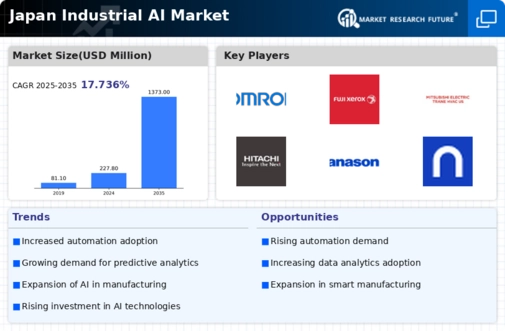Rising Demand for Efficiency
The Industrial AI Market in Japan is experiencing a notable surge in demand for efficiency across various sectors. Companies are increasingly seeking to optimize their operations, reduce waste, and enhance productivity. This trend is driven by the need to remain competitive in a rapidly evolving market. According to recent data, organizations that have integrated AI solutions report an average efficiency increase of 20-30%. This drive for efficiency is particularly evident in manufacturing, where AI technologies are employed to streamline processes and minimize downtime. As a result, the industrial ai market is poised for substantial growth, with projections indicating a potential market value exceeding $5 billion by 2027. The emphasis on operational efficiency is likely to continue shaping the landscape of the industrial ai market in Japan.
Rising Cybersecurity Concerns
As the industrial ai market expands in Japan, so do concerns regarding cybersecurity. The integration of AI technologies into industrial systems raises potential vulnerabilities that could be exploited by cyber threats. Companies are increasingly aware of the need to implement robust cybersecurity measures to protect sensitive data and maintain operational integrity. This heightened awareness is driving investments in AI-driven cybersecurity solutions, which are expected to grow significantly. Market forecasts suggest that the cybersecurity segment within the industrial ai market could see an increase of 30% by 2026. Addressing these cybersecurity challenges is crucial for the sustainable growth of the industrial ai market in Japan.
Focus on Workforce Augmentation
In Japan, there is a growing emphasis on workforce augmentation through AI technologies, which is reshaping the industrial ai market. Companies are increasingly recognizing the potential of AI to complement human capabilities rather than replace them. This approach aims to enhance productivity and improve job satisfaction by automating repetitive tasks while allowing employees to focus on more strategic activities. Research indicates that organizations implementing AI-driven workforce solutions have seen a 15% increase in employee productivity. This trend is likely to continue influencing the industrial ai market, as businesses seek to leverage AI to create a more skilled and efficient workforce.
Government Initiatives and Support
The Japanese government is actively promoting the adoption of AI technologies, which significantly impacts the industrial ai market. Initiatives aimed at fostering innovation and technological advancement are being implemented, including funding programs and tax incentives for companies investing in AI solutions. The government has set ambitious targets for AI integration across industries, aiming to position Japan as a leader in AI technology. Reports suggest that public sector investments in AI could reach approximately $1 billion by 2026, further stimulating growth in the industrial ai market. This supportive environment encourages businesses to explore AI applications, thereby enhancing their operational capabilities and contributing to the overall expansion of the industrial ai market.
Integration of IoT and AI Technologies
The convergence of Internet of Things (IoT) and AI technologies is transforming the industrial ai market in Japan. As industries increasingly adopt IoT devices, the need for intelligent data processing and analysis becomes paramount. AI algorithms are being utilized to interpret vast amounts of data generated by IoT sensors, enabling real-time decision-making and predictive maintenance. This integration is expected to enhance operational efficiency and reduce costs significantly. Market analysis indicates that the combination of IoT and AI could lead to a potential market growth of 25% in the industrial ai market by 2025. The synergy between these technologies is likely to drive innovation and create new opportunities within the industrial ai market.
















